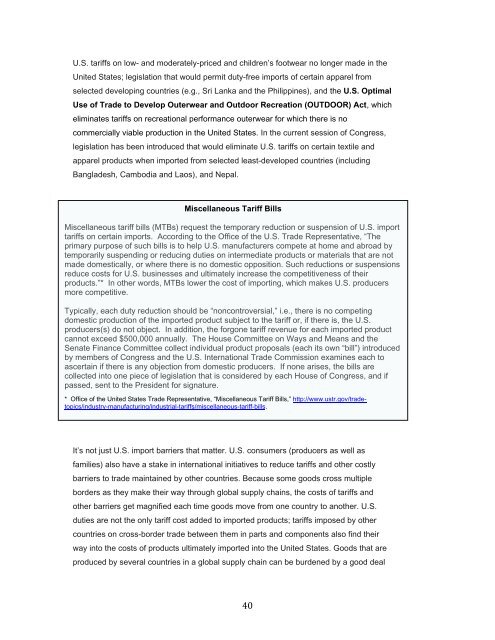Create successful ePaper yourself
Turn your PDF publications into a flip-book with our unique Google optimized e-Paper software.
U.S. tariffs on low- and moderately-priced and children’s footwear no longer made in the<br />
United States; legislation that would permit duty-free imports of certain apparel from<br />
selected developing countries (e.g., Sri Lanka and the Philippines), and the U.S. Optimal<br />
Use of Trade to Develop Outerwear and Outdoor Recreation (OUTDOOR) Act, which<br />
eliminates tariffs on recreational performance outerwear for which there is no<br />
commercially viable production in the United States. In the current session of Congress,<br />
legislation has been introduced that would eliminate U.S. tariffs on certain textile and<br />
apparel products when imported from selected least-developed countries (including<br />
Bangladesh, Cambodia and Laos), and Nepal.<br />
Miscellaneous Tariff Bills<br />
Miscellaneous tariff bills (MTBs) request the temporary reduction or suspension of U.S. import<br />
tariffs on certain imports. According to the Office of the U.S. Trade Representative, “The<br />
primary purpose of such bills is to help U.S. manufacturers compete at home and abroad by<br />
temporarily suspending or reducing duties on intermediate products or materials that are not<br />
made domestically, or where there is no domestic opposition. Such reductions or suspensions<br />
reduce costs for U.S. businesses and ultimately increase the competitiveness of their<br />
products.”* In other words, MTBs lower the cost of importing, which makes U.S. producers<br />
more competitive.<br />
Typically, each duty reduction should be “noncontroversial,” i.e., there is no competing<br />
domestic production of the imported product subject to the tariff or, if there is, the U.S.<br />
producers(s) do not object. In addition, the forgone tariff revenue for each imported product<br />
cannot exceed $500,000 annually. The House Committee on Ways and Means and the<br />
Senate Finance Committee collect individual product proposals (each its own “bill”) introduced<br />
by members of Congress and the U.S. International Trade Commission examines each to<br />
ascertain if there is any objection from domestic producers. If none arises, the bills are<br />
collected into one piece of legislation that is considered by each House of Congress, and if<br />
passed, sent to the President for signature.<br />
* Office of the United States Trade Representative, “Miscellaneous Tariff Bills,” http://www.ustr.gov/tradetopics/industry-manufacturing/industrial-tariffs/miscellaneous-tariff-bills.<br />
It’s not just U.S. import barriers that matter. U.S. consumers (producers as well as<br />
families) also have a stake in international initiatives to reduce tariffs and other costly<br />
barriers to trade maintained by other countries. Because some goods cross multiple<br />
borders as they make their way through global supply chains, the costs of tariffs and<br />
other barriers get magnified each time goods move from one country to another. U.S.<br />
duties are not the only tariff cost added to imported products; tariffs imposed by other<br />
countries on cross-border trade between them in parts and components also find their<br />
way into the costs of products ultimately imported into the United States. Goods that are<br />
produced by several countries in a global supply chain can be burdened by a good deal


